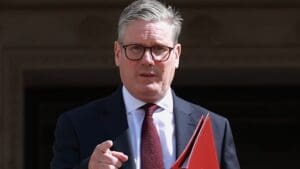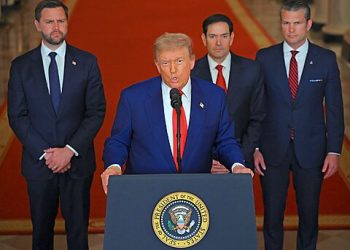Public sector workers now earn about 6 per cent more than their private sector counterparts — triple the gap seen at the start of this year — according to new analysis by the Resolution Foundation.
The think tank’s research indicates that a series of generous wage settlements under Sir Keir Starmer’s Government have widened the gulf between the two sectors.
The revelation is likely to fuel concerns that Whitehall is prioritising union demands over taxpayers, who have faced a £40bn tax raid in Rachel Reeves’s maiden Budget. Next year’s pay negotiations are already shaping up to be contentious, with teachers and medical professionals threatening industrial action over the Chancellor’s proposed above-inflation pay rise, which they consider insufficient.
Data shared by the Resolution Foundation show public sector monthly pay — in health, education and public administration — recently exceeded £2,640, compared with around £2,500 in the private sector. This shift has been driven largely by settlement deals for key groups such as junior doctors, who accepted a 22 per cent rise over two years, and train staff, who secured a 14 per cent deal and a halt to certain workplace reforms.
Mike Brewer, interim head of the Resolution Foundation, said: “Private sector pay has risen gradually over the past year, but the real change in the public sector happened in October, when NHS pay settlements took effect.”
However, critics warn that generous settlements risk fuelling inflation, undermining the Bank of England’s plans to bring down the cost of living, and draining the extra revenue from Ms Reeves’s tax increases without producing the anticipated investment in public services. The Bank recently cautioned that lingering uncertainties around pay threaten to delay potential interest rate cuts, while the Government has refused to rule out further tax rises.
Central government staff costs jumped to £18.3bn in November — a £2.4bn surge compared to last year, official data show. Ministers are under renewed pressure as departments consider a 2.8 per cent pay uplift next year, slightly higher than the projected 2.6 per cent inflation rate but still short of union expectations. The British Medical Association called the proposals a “very real risk of further industrial action,” while teaching unions and nursing bodies issued similar warnings.
Any larger pay offers would intensify pressure on the public purse. The Office for Budget Responsibility expects total government spending to increase by £239bn by 2030, surpassing £1.5 trillion for the first time. Britain’s economic recovery remains fragile, with flat growth in the third quarter of 2024 and a 0.1 per cent GDP contraction in October, edging the country closer to recession.
The Resolution Foundation’s findings also show that higher earners are set for a £356 per-person hit next year, equivalent to a 0.6 per cent reduction in living standards. The wealthiest tenth of households will bear the brunt of Ms Reeves’s record £40bn tax rise, while those on lower to middle incomes stand to see a small gain, largely because of expanded public services and increased minimum wages.
Although Labour’s plan aims to address chronically underfunded public services, the tax raid is predicted to depress private sector pay, particularly after employer National Insurance contributions rose from 13.8 per cent to 15 per cent. Private sector employers now bear this burden, whereas the public sector is exempt.
Mr Brewer noted: “People may not feel better off in purely financial terms, but the Government hopes they will if public services become less dysfunctional.”
Experts warn that a subdued economic outlook, alongside mounting public pay demands, could lead to yet another round of tax measures. Carl Emmerson of the Institute for Fiscal Studies (IFS) pointed out that with slim headroom for growth, the Government may have to abandon or revise its fiscal targets.
Despite these uncertainties, a Treasury spokesman insisted the Government has “wiped the slate clean” and must now focus on delivering “our Plan for Change”, which hinges on attracting investment and boosting productivity. In the meantime, the growing pay chasm between public and private employees — set against a backdrop of simmering union tensions — underscores the challenges facing Britain’s economy under Labour’s stewardship.
Read more:
Pay gulf widens between public and private sectors under Starmer
















